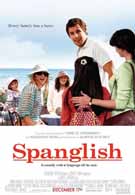Spanglish should be a five star movie. It has everything you could possibly want from a potential Oscar winner: Adam Sandler continuing the excellent dramatic foundation he laid with Punch Drunk Love, the story of two daughters at odds with their mothers trying to figure out who they are, a hot latin woman with loose fitting clothing blowing in the wind, all brought to you by the genius behind As Good As It Gets and Terms of Endearment. What could go wrong?
Nothing, it would seem, except trying to create an ending. For an hour and a half of its almost two hour runtime, Spanglish is a brilliant tale of genuine characters, excellently portrayed by wonderful actors across the board - basically the very thing we’ve come to expect from writer/director/producer James L. Brooks. Then, around that hour and a half mark, the movie fizzles out. Tension has been built up here, conflict has occurred there, and the film doesn’t know what to do with it, making the movie frustrating to watch as it concludes.
The second biggest problem the film has is its own trailer. See, the trailer depicts the movie as being something it’s not. First of all, it’s not a film with Adam Sandler as the main character, which is what the trailer would have you believe. Actually the main character is Flor Moreno (Paz Vega), whose daughter Cristina (Shelbie Bruce) narrates the story, which is told through an essay on her application to Princeton (the narration of the adult Cristina is provided by Aimee Garcia). In this essay, Cristina tells the story of her and her mother’s move from Mexico to America, and why her mother is the most influential person in her life. Sandler plays John Clasky, whose wife Deborah (Téa Leoni) hires Flor as a housekeeper/nanny to watch over the Clasky household and their two kids: the troublesome Georgie (Ian Hyland) and the slightly overweight Bernice (Sarah Steele). There is, of course, a cultural rift as the non-english speaking Flor adapts to working for the Claskys, a rift that is fueled further as the Claskys rent a summer home on the coast -- and ask Flor to move in with them, along with daughter Cristina.
Within the two families there are two different schools of thought on raising children... actually three different schools since John and Deborah seem to have varying and opposing theories on raising their own kids. John attempts to teach the kids independence and accepts them as they are. Deborah on the other hand, wants her kids to be perfect little sheep. Seeing her own kids as failures and Flor’s daughter as a well mannered, beautiful (and thin) young lady, Deborah starts to treat Cristina as she’d like to pamper her own daughter, alienating her own family and angering Flor. Quickly the story adds the different theories of parenting to the cultural rift in the film’s conflicts. Add on top of that a slight attraction between John and Flor, as well as trouble in John and Deborah’s relationship, and you’ve got plenty of the aforementioned conflict and tension.
The acting in Spanglish is superb, and the fact that the script gives them well rounded characters is an added plus. Sandler takes a wonderful approach to John Clasky, a guy who struggles to be a nice guy in front of his family, which means he expends his frustration shouting in his car when they aren’t around. Sandler will make it to Oscar-caliber drama one day, but I don’t think this film is the one for him yet. Leoni plays the perfect bitch, although one gets the feeling the character might be a little too close to the personality she’s perceived as having through the press. The two actors create this perfect dynamic of complete and total opposites, and it makes you wonder how these people even ended up together, although not to the point that it distracts from the film (and it is explained for those who are quick to pick up on things). Paz Vega proves with her American debut that she’s more than just a pretty face (although she definitely is that too) with a complex role. Her facial reactions alone are incredible, particularly when her character doesn’t speak English, or is learning it. Even the kids avoid being overly cute or general bad acting in favor of developing characters that you can relate to. For me the real accomplishment of the film is Cloris Leachman who I’m typically not a fan of. She makes a really memorable character out of Evelyn Norwhich - Deborah’s alcoholic mother. The only character who really suffers anything is the Clasky son, Georgie, who really doesn’t have a purpose for being in the movie other than to give the Claskys more than one kid.
I’m okay with the story of the movie being different from the trailer, but there is one thing the trailer has going for it the movie doesn’t - editing. There are at least two moments presented differently in the film’s initial trailer, and are better in the trailer than in the final product. The first is a small joke about Evelyn’s drinking problem that would be easy to overlook. The second, however, is a big deal. Every commercial and trailer I’ve seen for Spanglish has presented Sandler’s character’s big speech on kids (“Worrying about your kids is sanity, and being that sane... can drive you nuts”). The first trailer for the film had an extended version of the speech that really stuck with me, and it appalled me to discover wasn’t in the film. The truncated version of the speech is nowhere near as powerful, and that’s a real shame.
Spanglish proves that strong relatable characters and a deeply emotional story just doesn’t cut it if you don’t have a decent ending. While I probably would have been embarrassed to enjoy a more “Hollywood” finale, it would have been a step above the lack of an ending we get with the movie. Although it’s nice to see the characters built up so their lives extend beyond the span of the film, it would have been better to see some sort of resolution for more of them, particularly for the Clasky family. Since they aren’t the primary focus, it feels as if we join them in the middle of one crisis, and leave them in the middle of another. When you have characters this strong, the audience is going to want some sort of closure, something Spanglish fails to deliver. In the end that’s most likely going to cost the movie and its actors the credit and honor they would otherwise deserve.
Your Daily Blend of Entertainment News

